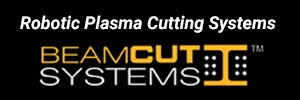Easy Pickings
Back to Basics: Check out how the steel shaper in this case study uses lift tables to reduce labor and improve safety in an innovative transfer line that feeds bars, angles, and tubing to its three metal saws.
Posted: August 11, 2008
When the 85 employees of Power Curbers, Inc., moved into a larger manufacturing plant in Salisbury, North Carolina last summer, most of them got their first look at a unique labor-saving system. Designed by the company's project engineer Mark Vanhoy, with the help of Bill Miller, a Power Curbers fabricator, and built by Miller, welder Chris Evans, and mold line supervisor Walter Pence, the creation had been in the works for more than a year.
The assembly line at Power Curbers shapes steel into more than 1,000 different parts for the products the company has been turning out, and improving, for more than 54 years – machinery for the extruding and on-site molding of concrete (known in the industry as slipforming) for curbing, sidewalks, etc. Power Curbers equipment is used all over the world, in 80 countries to date.
The new system was installed at the very beginning of the assembly line as a series of three parallel roller beds between the plant's three metal saws and a new 6-ft-high storage rack that holds, in 197 shelf compartments, 197 differently shaped lengths of steel (bars, angles, round tubing, square tubing, etc.). These are all roughly 20 ft long but can weigh from 50 lb to 1,500 lb.
The ergonomic system streamlines the transfer of the steel to the saws, where it is clamped in place and cut into shorter pieces that become parts as they are milled, welded, turned, and coated farther down the line. Mounted on lift tables, the roller beds can hold up to six lengths of steel at a time. In keeping with the company's passion for lean manufacturing practices, the system significantly reduces the labor required to just one employee.
As an extra bonus, the new procedure is also safer than the way the saw was fed at the old plant. The old method required employees to lift as much as 10,000 lb of steel in a single day, dragging each piece from its rollerless shelf, hooking it onto a cable hanging from an overhead crane, balancing it to minimize tipping, and then grappling with it to bring it into position at the saw, where it was clamped in place for cutting.
Two of the new roller beds can be independently moved vertically and horizontally, to line up in front of particular shelves. They are bolted to long, narrow lift tables that provide vertical movement. These were manufactured by the Manila, AK plant of Southworth Products Corp. (Portland, ME), which offers a large selection of equipment designed to improve productivity and worker safety in all sorts of lifting and positioning applications, including work-positioning tables, portable lifts, container tilters, and pallet-handling equipment.
"We've had these lift tables for years and they work very well," says Vanhoy. "They come in handy for so many tasks, they've saved us a lot of back strain on our assembly line, and they're built to last."
After consulting Scott Hartman of Advanced Equipment Company (a Wilmington, NC distributor) and Peter Horne, Southworth's regional sales manager based in nearby Charlotte, Vanhoy chose two LST4-48 Tandem Lifts that are designed to provide level rise for long loads such as lumber, pipes, bar stock, etc. Supported by two electric/hydraulic scissor-leg assemblies, each 24 in x 168 in platform is raised and lowered with the flip of a switch. Each has a capacity of 4,000 lb. The required 3-phase power feed is 460 volts.
Each lift is bolted to the top of a welded 2,000 lb frame that rises about ¼ in off the floor when a large air bag is inflated with compressed air. For horizontal movement, Vanhoy's system uses linear bearings, a Thompson rod, and a servo-control motorized (single-phase, 115 volts) drive wheel to move the whole structure, which rides a rail at one end to keep it perpendicular to the storage rack. The inflated airbag slides along a wide strip of sheet metal built into the floor.
To pick the right piece of steel from the rack, the operator uses a single control panel to move the platform into position in front of the right shelf. Then he or she grabs the required piece and pulls it across the rollers to the saw. Because the floor of every storage compartment is also a roller bed, a single person can move even the heaviest lengths of steel. The whole system contains 18,000 rollers.
The new system has eliminated most of the lifting and walking that was needed at the old plant to bring the steel to the saw, and Vanhoy estimates the labor savings at three hours for every 8-hour shift – a reduction of more than 35 percent for the operation.
"I'm happy to report that the new system is working well, and we are grateful to Southworth for their collaboration on this project as well as for the reliability of their lift tables, which are important components of our new system."
For more information, visit www.southworthproducts.com, call 207-878-0700 (toll-free: 800-743-1000), fax to 207-797-4734, e-mail [email protected], or write to Southworth Products Corp, P.O. Box 1380, Portland, ME 04104-1380.













